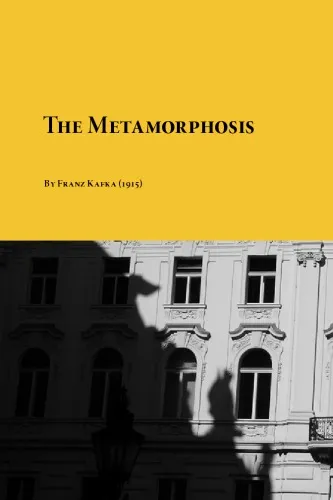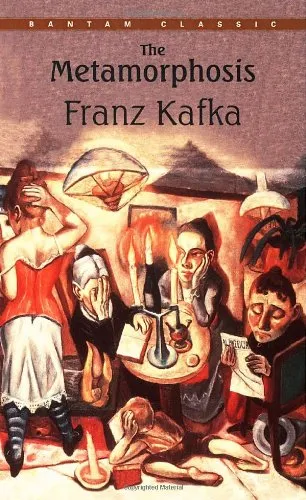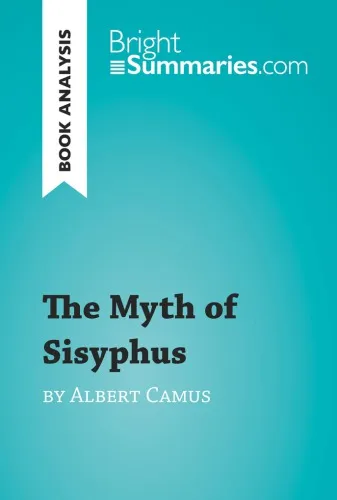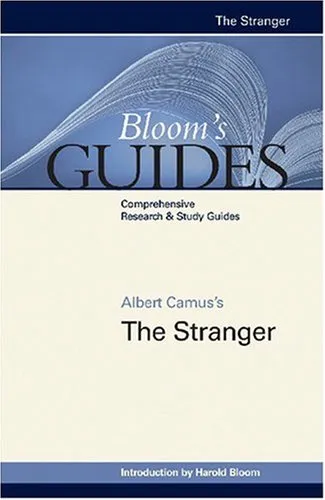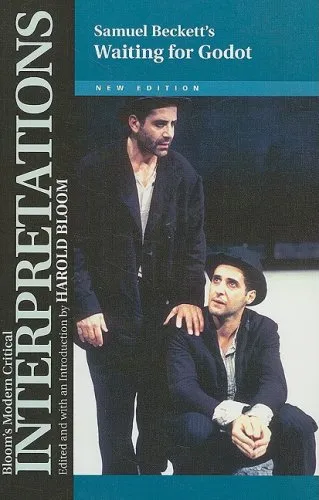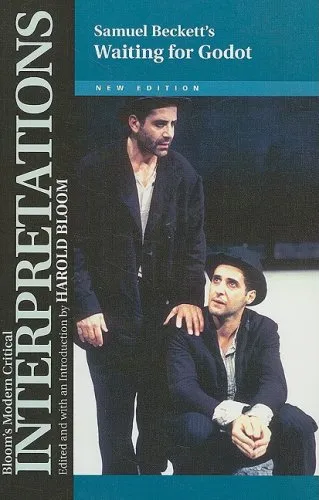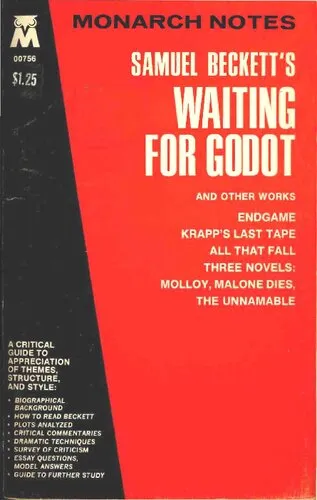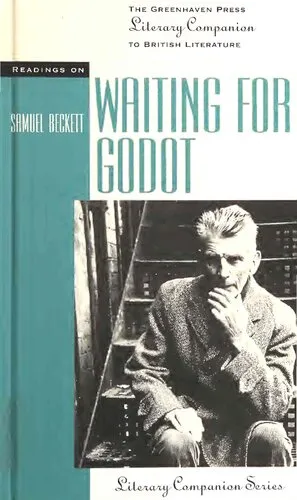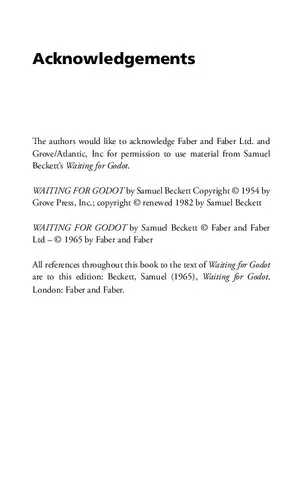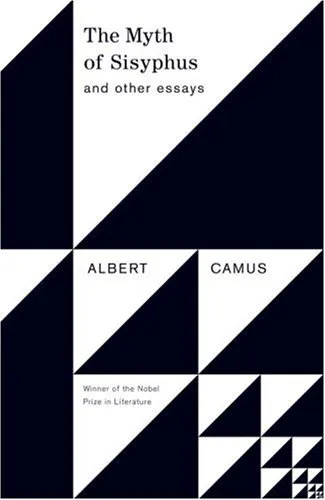Samuel Beckett, Waiting for Godot
4.6
بر اساس نظر کاربران

شما میتونید سوالاتتون در باره کتاب رو از هوش مصنوعیش بعد از ورود بپرسید
هر دانلود یا پرسش از هوش مصنوعی 2 امتیاز لازم دارد، برای بدست آوردن امتیاز رایگان، به صفحه ی راهنمای امتیازات سر بزنید و یک سری کار ارزشمند انجام بدینکتاب های مرتبط:
معرفی کتاب 'Samuel Beckett, Waiting for Godot'
کتاب 'Samuel Beckett, Waiting for Godot' یکی از آثار برجستهی نمایشنامهنویسی قرن بیستم است که به وسیلهی Samuel Beckett نوشته شده است. این کتاب، اثر پیچیدهای است که به صورت گستردهای نقد شده و بر تئاتر مدرن تاثیر گذاشته است.
خلاصهای دقیق از کتاب
'Waiting for Godot' داستان دو شخصیت، ولادیمیر و استراگون، را روایت میکند که در کنار جادهای منتظر فردی به نام گودو هستند. این دو شخصیت درگیر گفتگوهای فلسفی و باری خشک و گاهی بیمعنی هستند که نشانگر ابهام و پوچی زندگی است. در طول نمایشنامه، آنها با شخصیتهای دیگری نیز مواجه میشوند، از جمله پوتزو و لاکی، که هر یک به شیوهای به بررسی موضوعات پیچیده و فلسفی میپردازند.
نکات کلیدی
- بنیاد نمایشنامه بر مفهوم انتظار و پوچی استوار است.
- بررسی عمیق مفاهیمی چون زمان، وجود و ماهیت ارتباط انسانی.
- نقدی بر روتینهای روزمره و معنای زندگی.
جملات معروف از کتاب
"Nothing to be done, it's hopeless."
"They give birth astride of a grave, the light gleams an instant, then it's night once more."
"We always find something, eh Didi, to give us the impression we exist?"
چرا این کتاب مهم است
'Waiting for Godot' نه تنها به عنوان یک اثر پیشرو در تئاتر آبزورد شناخته میشود، بلکه تاثیر عمیقی بر محیط ادبی و فلسفی زمان خود گذاشته است. این نمایشنامه به شیوهای مبتکرانه، بحرانهای وجودی و خستگیهای ذهنی انسان را به تصویر میکشد و همچنان به عنوان یکی از آثار برجسته و علمی شناخته میشود که موضوعاتی همچون انتظار، معنی و پوچی را به چالش میکشد.
Introduction to "Samuel Beckett, Waiting for Godot"
Samuel Beckett's "Waiting for Godot" stands as a monumental work in the realm of modern theater, defining the genre of absurdist drama and reshaping narrative exploration with its minimalist approach and existential themes. This introduction delves deeply into the nuances of the play, offering insights into its structure, themes, and cultural impact.
Detailed Summary of the Book
"Waiting for Godot" is a play that unfolds in two acts. The story centers around two main characters, Vladimir and Estragon, who engage in a series of conversations while waiting for someone named Godot. The narrative is marked by its seemingly circular plot structure, where time appears stagnant and conversations with meandering thoughts offer little in the way of resolution. Beckett uses this setup to explore fundamental themes such as existentialism, the absurdity of human existence, and the dichotomy of hope and despair.
The play predominantly takes place on a country road with a single barren tree, symbolizing stark desolation and barrenness, which is reflective of the characters' inner worlds. While waiting endlessly, Vladimir and Estragon encounter other characters such as Pozzo and Lucky, who contribute to the surreal quality of the narrative with their own perplexing and symbolic companionships. Throughout the play, Godot’s identity remains a mystery, which underlines the existential uncertainty at the play's core, leaving both the characters and the audience suspended in perpetual anticipation.
Key Takeaways
"Waiting for Godot" invites audiences to contemplate significant philosophical questions. One key takeaway is the theme of existential waiting and the search for meaning in life. The play effectively captures the human condition of seeking purpose amidst apparent meaninglessness. The interactions between Vladimir and Estragon also highlight the importance of companionship in enduring life's uncertainties. Moreover, the repetition and lack of conventional plot progression reinforce the idea of cyclical time and the monotony that often accompanies existence.
Famous Quotes from the Book
Beckett's "Waiting for Godot" is imbued with lines that resonate deeply and provoke thought. Some of the most notable include:
- "Nothing to be done." - This phrase captures the essence of the play's existential conundrum and the recurring theme of inertia.
- "We always find something, eh Didi, to give us the impression we exist?" - This line poses important questions about purpose and perception.
- "Let's go." "We can't." "Why not?" "We're waiting for Godot." - This exchange highlights the central act of waiting and the resulting paralysis.
Why This Book Matters
"Waiting for Godot" is pivotal in modern literature because it challenges traditional narrative forms and expectations. The play’s reliance on dialogue and minimal action emphasizes the depth of human introspection and communication. Beckett’s work is a cornerstone in the literature of the absurd, influencing countless writers and thinkers. Its endurance over decades highlights its timeless relevance, maintaining its place as a subject of scholarly discussion, theatrical performance, and philosophical debate. This play matters because it pushes boundaries, inviting continuous exploration into the fabric of human existence.
دانلود رایگان مستقیم
شما میتونید سوالاتتون در باره کتاب رو از هوش مصنوعیش بعد از ورود بپرسید
دسترسی به کتابها از طریق پلتفرمهای قانونی و کتابخانههای عمومی نه تنها از حقوق نویسندگان و ناشران حمایت میکند، بلکه به پایداری فرهنگ کتابخوانی نیز کمک میرساند. پیش از دانلود، لحظهای به بررسی این گزینهها فکر کنید.
این کتاب رو در پلتفرم های دیگه ببینید
WorldCat به شما کمک میکنه تا کتاب ها رو در کتابخانه های سراسر دنیا پیدا کنید
امتیازها، نظرات تخصصی و صحبت ها درباره کتاب را در Goodreads ببینید
کتابهای کمیاب یا دست دوم را در AbeBooks پیدا کنید و بخرید
1542
بازدید4.6
امتیاز0
نظر98%
رضایتنظرات:
4.6
بر اساس 0 نظر کاربران
Questions & Answers
Ask questions about this book or help others by answering
No questions yet. Be the first to ask!


